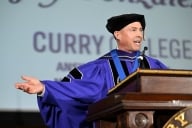You have /5 articles left.
Sign up for a free account or log in.
The United Nations Educational, Scientific, and Cultural Organization (UNESCO) has had a rough year. Last fall UNESCO’s membership voted to accept Palestine’s bid to join, breaking ranks with the rest of the UN family and flouting the “One UN” policy in the process. The fateful vote also cost UNESCO the financial goodwill of the United States, its largest financial contributor, to the tune of some US$80 million per year.
Yet while Director-General Irina Bokova works to patch things up in Washington, and UNESCO’s financial strictures increasingly become an organizational fact of life, it is also worth recalling the words of President Obama’s onetime Chief of Staff Rahm Emmanuel, to the effect that “You never want a serious crisis to go to waste.” Madame Bokova is losing no time, pushing through a comprehensive roadmap of internal reforms as of last month’s Executive Board session, and I am told many related changes are afoot in the Organization’s education sector.
Of particular interest to readers of The World View, a combination of retirements, restructuring, and departures in the last few years has led to a sea change in the Organization’s Paris-based higher education work. Higher education, once a whole division of UNESCO-Paris’ education sector, has gradually shrunk to a small section that, at this writing, comprises but a few people. This is arguably a major setback for an organization such as UNESCO, which provided the venue for international HE milestones such as the 1998 and 2009 World Conferences, and a seminal, richly funded international higher education research partnership with the Swedish International Development Cooperation Agency.
That said, stripping la maison back to the studs, and taking a moderately bullish view of the future, could also reposition UNESCO-Paris for some significant strategic opportunities. So can the Section for Higher Education leverage is shrunken size and resources, and (in the medium term) consolidate its prospects as a dynamic and coherent voice on higher education issues? UNESCO’s visibility and network across the Global South remain enormous, and being humble, lean, and hungry never hurt anyone.
In short, this is an opportune time for UNESCO to consider its stated goals, and engage in some free and objective thinking regarding its achievements and resources to date. The past is past, but the HE work can and should still be optimized. The “New UNESCO’s” resulting agenda, however modest, then needs to meaningful—and meaningfully rooted in the Organization’s mandate, including the joint priorities that are Education for All (EFA) and the Millennium Development Goals (MDGs); this has not always been the case. Once it comes to planning activities, the HE section’s current resources are admittedly modest—but is that a bad thing? More regular program funding, more people, and more extra-budgetary resources can always be layered on later. In the meantime, closer collaboration with in-house partners such as the Organization’s education institutes and regional bureaus for education will be a key driver of success.
Since “coherence” is a UN watchword these days, and the Organization has something to prove since last fall, here are five lines of it:
1. Meaningful collaboration between the HE section in Paris and the Organization’s field offices, institutes, and centers.
2. Better links, within a restructured division, to teacher education, EFA, the Science and Social/Human Sciences sectors, and the UNESCO Chairs network.
3. MDG tie-ins that are clear and relevant, perhaps through a more robust role for the UNESCO Chairs in grouping their work across common action areas.
4. Enhanced interaction with key segments of the international academic community.
5. Streamlined collaboration with international organization partners such as the OECD and World Bank.
In higher education matters, what is UNESCO’s comparative advantage anyway? That is the question, and there must be an answer.
Daniel Lincoln is a visiting scholar at the Center for International Higher Education, Boston College. He is editor of European Journal of Higher Educationand special issues editor of Studies in Higher Education.





